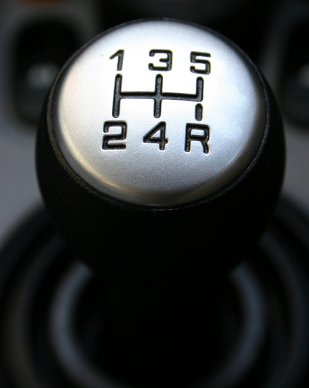Some car maintenance words are so … challenging. You hear them. You play along – of course, you know what they mean. Who doesn’t know what a differential is? Or a serpentine belt, a tie rod, or a caliper. A transmission? Well …
We get it. Not everyone is meant to be a mechanic. You have a lot going on in your life. You’re running around from morning til night. You don’t need to know the inner workings of a transmission. But what you do need to know is the importance of transmission service.
A Car Transmission – The Basics
When you hear the term transmission, think about wheels. A transmission is a mechanical component that is responsible for transmitting power from the engine down to the wheels. It gives you the ability to control the car’s speed and torque by shifting gears. This allows the engine to operate efficiently across various speeds and driving conditions.
This is what allows you to accelerate, decelerate, and maintain speed.
You may be driving an automatic transmission now, but there are several other types. A manual transmission allows you to manually shift gears using a clutch pedal and a gear stick. A continuously variable transmission provides seamless acceleration without distinct gear shifts by using a system of pulleys and belts. A dual-clutch transmission uses two separate clutches for odd and even gear sets, creating faster and smoother gear shifts.
If your brain is already moving to “too much information,” we get it. We’re not going to give you the advanced version of how a transmission works. Suffice it to say that all you need to know is that your car won’t go if the transmission isn’t operating well. That’s why transmission service is so important.
Is It Time To Schedule Transmission Service?
If you’ve been driving for any length of time, you know cars need regular service to keep operating. With thousands of parts, each system is set up on its own schedule. The best way to learn about each system is to check with your owner’s manual. Of course, getting to know a local mechanic can help too. They can keep you updated on how well your car is operating, and what you can expect in the future.
Transmissions aren’t like oil changes – they don’t need servicing every few thousand miles. That said, most makes and models do suggest transmissions are serviced every 30,000 to 60,000 miles or so, just to ensure they’re working well.
This is where a mechanic will change transmission fluid and filter, inspect the transmission pan, and check for leaks and other issues. They’ll look for any signs or wear or damage, and evaluate it for proper operation.
The 30,000 to 60,000 rule is just a suggestion. Think about the way you drive. If you frequently drive under severe conditions – towing, driving in heavy traffic, or in extreme temperatures – you might need to bring your car in more frequently.
What a Mechanic Will Do During a Transmission Service
You bring your vehicle in for a transmission service. A mechanic will start with a transmission fluid change.
This means the mechanic will drain the old transmission fluid and refill it with new fluid. This helps to remove contaminants and ensure the transmission operates smoothly.
Transmission fluid is essential for a variety of reasons.
- It lubricates the moving parts inside the transmission, reducing friction and preventing wear and tear.
- It helps dissipate heat generated by the transmission during operation, preventing overheating, which can cause damage.
- In automatic transmissions, the fluid acts as a hydraulic fluid, enabling the transmission to shift gears smoothly.
- It contains detergents and additives that help clean and protect the internal components from corrosion and buildup of debris.
- It ensures the transmission operates efficiently, providing smoother gear shifts and better overall performance.
- It prevents damage. Old, degraded fluid can lead to overheating, slipping, or harsh shifting, which can cause significant damage to the transmission components.
That’s a lot of reasons to upgrade your transmission fluid, right? If for no other reason than to give your car new transmission fluid – that should be reason enough to bring it in for regular servicing. Of course, a mechanic does more than that.
They’ll replace the transmission filter, which helps keep the fluid clean by trapping debris and particles. They’ll remove the transmission pan, clean it, and inspect it for any metal shavings or debris that can indicate wear or damage. They’ll check for fluid leaks. They’ll inspect and adjust bands and clutches and clutches and gears, just to ensure everything is working the way it should.
And that’s all that really matters. When you drive away, you want the peace of mind that comes with knowing your car is in good shape and won’t need servicing again for a long while.
You’re good to go, and your passengers will be safe and secure as you go about your busy days.
Your Transmission Is Saying: It’s Time For Servicing
The easiest way is by watching your mileage – if it’s been 30,000 to 60,000 miles since your last transmission service, it may be time. Of course, vehicles are built to alert you when things are starting to go wrong.
That trusty check engine light on your dashboard is a catch-all for all sorts of vehicle issues. When that pops on, schedule a visit. It helps keep your car in tip-top shape, fixing minor issues before they grow more significant.
Pay attention to strange noises, like whining, humming, clunking, especially when shifting gears. Or if you notice anything funny with the way the car shifts – it might slip out of gear while driving, or delay when shifting from park to drive. These are all signs the transmission needs attention.
See a leak on your driveway where you normally park your car? If it’s a reddish color, it can indicate a transmission fluid leak. You can also pop the hood to see if you notice leaks. If you regularly check the transmission fluid’s color and consistency, it should be a clear reddish color. If it’s dark, dirty, or has a burnt smell, it’s time for a change.
Bottom line: if something “feels” off, it’s best to bring it in.
You know your car. You know if something doesn’t feel right. And if you notice any of the signs above, it might be your transmission. Bring it in, we’ll fix it, and have you on the road again.
Isn’t that what’s most important?



